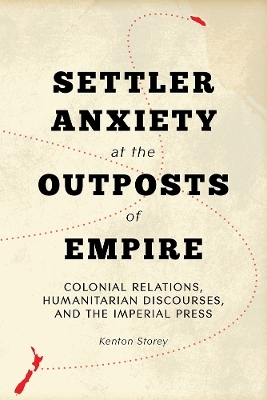
Settler Anxiety at the Outposts of Empire
Colonial Relations, Humanitarian Discourses, and the Imperial Press
Seiten
2016
University of British Columbia Press (Verlag)
978-0-7748-2947-2 (ISBN)
University of British Columbia Press (Verlag)
978-0-7748-2947-2 (ISBN)
A fascinating look at how humanitarian language was used by the colonial press in New Zealand and on Vancouver Island to justify ongoing settler expansion while allaying fears of Indigenous resistance.
Following the Indian Rebellion of 1857, fear of Indigenous uprisings spread across the British Empire and nibbled at the edges of settler societies. Publicly admitting to this anxiety, however, would have gone counter to Victorian notions of racial superiority.
In Settler Anxiety at the Outposts of Empire Kenton Storey opens a window on this time by comparing newspaper coverage in the 1850s and 1860s in the colonies of New Zealand and Vancouver Island. Challenging the idea that there was a decline in the popularity of humanitarianism across the British Empire in the mid-nineteenth century, he demonstrates how government officials and newspaper editors appropriated humanitarian rhetoric as a flexible political language. Whereas humanitarianism had previously been used by Christian evangelists to promote Indigenous rights, during this period it became a popular means to justify the expansion of settlers’ access to land and to promote racial segregation, all while insisting on the “protection” of Indigenous peoples.
Following the Indian Rebellion of 1857, fear of Indigenous uprisings spread across the British Empire and nibbled at the edges of settler societies. Publicly admitting to this anxiety, however, would have gone counter to Victorian notions of racial superiority.
In Settler Anxiety at the Outposts of Empire Kenton Storey opens a window on this time by comparing newspaper coverage in the 1850s and 1860s in the colonies of New Zealand and Vancouver Island. Challenging the idea that there was a decline in the popularity of humanitarianism across the British Empire in the mid-nineteenth century, he demonstrates how government officials and newspaper editors appropriated humanitarian rhetoric as a flexible political language. Whereas humanitarianism had previously been used by Christian evangelists to promote Indigenous rights, during this period it became a popular means to justify the expansion of settlers’ access to land and to promote racial segregation, all while insisting on the “protection” of Indigenous peoples.
Kenton Storey is a historian of the British Empire and a legal researcher working in the field of First Nations history. He has published articles in the Journal of the Canadian Historical Association, the Journal of British Studies, and contributed a chapter to New Zealand’s Empire.
Introduction
1 A Short History of New Zealand and Vancouver Island
2 Violence and Eviction on Vancouver Island
3 New Zealand’s Humanitarian Extremes
4 Aboriginal Title and the Victoria Press
5 The Auckland Press at War
6 Colonial Humanitarians?
7 The Imperial Press
Conclusion
| Erscheinungsdatum | 16.05.2016 |
|---|---|
| Zusatzinfo | 4 figures, 6 maps |
| Verlagsort | Vancouver |
| Sprache | englisch |
| Maße | 152 x 229 mm |
| Themenwelt | Geisteswissenschaften ► Geschichte ► Regional- / Ländergeschichte |
| Sozialwissenschaften ► Kommunikation / Medien ► Allgemeines / Lexika | |
| Sozialwissenschaften ► Kommunikation / Medien ► Medienwissenschaft | |
| Sozialwissenschaften ► Soziologie | |
| ISBN-10 | 0-7748-2947-8 / 0774829478 |
| ISBN-13 | 978-0-7748-2947-2 / 9780774829472 |
| Zustand | Neuware |
| Haben Sie eine Frage zum Produkt? |
Mehr entdecken
aus dem Bereich
aus dem Bereich
Erinnerungen
Buch | Softcover (2024)
Pantheon (Verlag)
16,00 €


